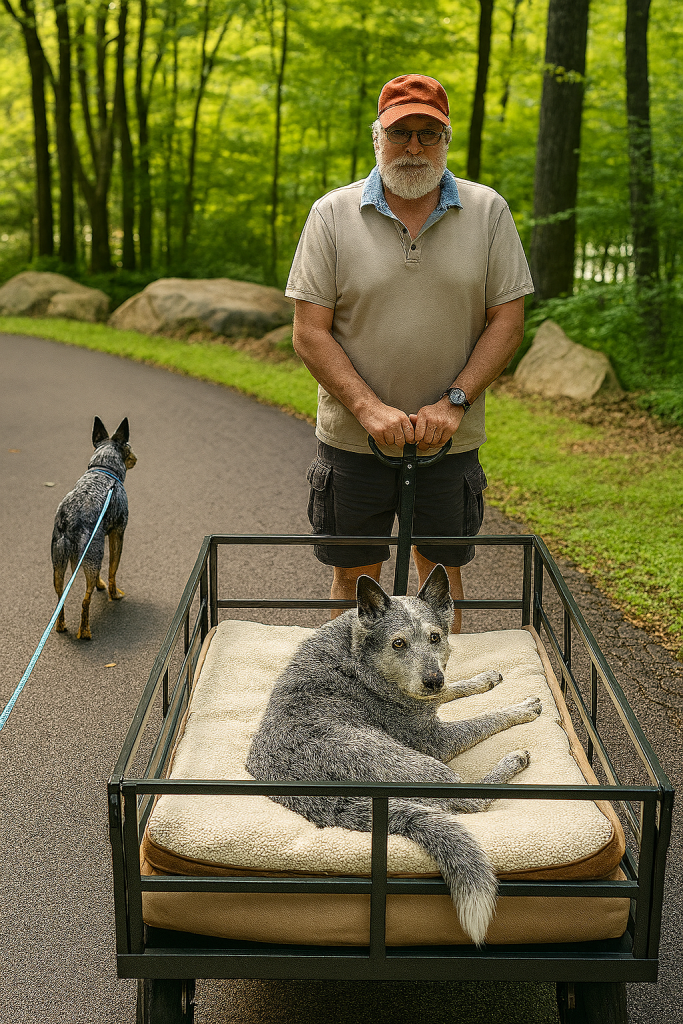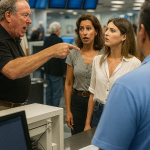It was my regular jog along the park pathway, headphones engaged, thoughts meandering. At that point, I observed him—an elderly gentleman with an extended white beard, pulling a small conveyance behind him. Within it rested a canine—gray-faced, rigid, exhibiting minimal movement. Another, younger dog ambled alongside them.
Initially, I offered a slight smile, feeling a degree of emotional connection. However, I then paused.
The elder dog did not even elevate its head. It remained recumbent upon a cushion, appearing as though it had not stood for days. And for reasons I cannot articulate, I impulsively uttered, “Why not allow him to depart? I mean… is he not experiencing hardship?”
He slowly directed his gaze upward. His eyes conveyed weariness, yet possessed a calm demeanor. “He is not suffering,” he stated. “He is simply advanced in age. The same as myself.”
I found myself without words in response.
He glanced downward at the dog and gently stroked its back. “He preserved my existence,” he articulated, in a voice remarkably soft. “During a period when I felt no desire to witness another morning, he would not permit me to remain in bed. He compelled me to walk. He compelled me to consume food. He brought laughter back into my life.”
Then he regarded me—with genuine attentiveness. “Now he is unable to walk, so I walk on his behalf. That is the understanding.”
I stood immobile. My face felt warm, and I could not discern the reason.
He clicked his tongue, and the younger dog resumed its movement. The cart’s wheels emitted a creaking sound behind them, slow and steady, as they receded down the pathway.
I have not ceased contemplating that interaction since. For how long can he persist in this manner?
For the ensuing few days, I avoided the pathway. Not intentionally, to be precise, but something about witnessing him unsettled me. Perhaps it was a sense of culpability. Or humiliation. Or simply… a remembrance that affection assumes a different form when it lacks ease.
However, one misty morning, I discovered myself back upon the route.
I surveyed my surroundings, partially hoping I would not encounter them. Yet there he was again, moving with characteristic slowness, pulling the cart behind him. This time, however, he was not solitary.
A teenage girl walked beside him, carrying a thermos, engaging in conversation while the man nodded. The younger dog darted forward and circled back incessantly, as though exhibiting its prowess.
I hesitated, then approached and extended a wave. He recognized me immediately and offered a small nod. “I did not anticipate seeing you again,” he expressed.
“Nor did I,” I confessed. “I have been reflecting upon your words.”
The girl smiled and introduced herself as Anya—his granddaughter. “Grandpa comes here each morning,” she explained. “Even when it rains. I began accompanying him last month when I relocated.”
The elderly gentleman chuckled. “She ensures I do not overlook my tea now.”
I looked down at the dog in the cart. He appeared… serene. As though devoid of discomfort. Simply at rest.
“His name is Dusty,” Anya stated, perceiving my thoughts. “He is twenty years of age. Grandpa has had him since he was a young pup.”
Twenty. I blinked. That represented nearly three average canine lifespans.
“He was my late wife’s suggestion,” the man added. “She mentioned I needed a reason to leave the house following my retirement. It transpired, she was correct.”
He looked down at Dusty once more and smiled.
“I was without much purpose after she passed. I did not consume food. I did not sleep. Dusty would bark at me if I remained in bed. He began nudging me toward the leash. He would not desist until I walked him. I believe he understood.”
I listened silently. My chest again felt constricted, akin to that initial occasion.
“And now?” I inquired softly.
“Now I am indebted to him,” he responded simply. “He granted me years I would have discarded. So I dedicate mine to him now. That is equitable, is it not?”
I nodded. It was more than equitable. It possessed profound beauty.
Following that day, I resumed my runs on the pathway, but this time I sought their presence. Some days I would wave from a distance. Other days I would reduce my pace, walking with them for a period.
One morning, Anya extended a coffee to me. “I presumed you might wish to accompany us today,” she remarked with a grin.
I accepted it, somewhat surprised by the ease with which I assented.
We conversed little that day. We simply walked. The younger dog pursued squirrels, Dusty slept in his cart, and the man hummed an ancient melody beneath his breath.
It evolved into a kind of custom. Every Tuesday, I would walk with them instead of running. It did not feel like physical exercise, but it felt like something more significant.
One day, I noticed Dusty’s eyes did not open at all. His respiration was shallow, his chest rising and falling like a whisper. I looked at the man, feeling concern.
“He is well,” he stated gently. “He experiences good days and drowsy ones.”
Anya did not speak much that morning, nor did I. However, when we parted ways, she bestowed a prolonged kiss upon Dusty’s head.
The subsequent Tuesday, they were absent.
I convinced myself they had likely chosen a different route. Yet when they did not appear on Thursday either, I felt a tightness in my chest.
On Saturday, I observed Anya seated alone on a bench. The younger dog remained by her side, its tail lazily thumping. The cart stood empty.
I approached slowly, already steeling myself.
“He departed two nights prior,” she stated quietly, her eyes reddened yet dry. “During his sleep. Grandpa was with him throughout.”
I sat down slowly, uncertain of what to communicate.
“He was prepared,” she added. “I believe he awaited Grandpa’s final nod. They simply… lay together on the floor, without distress. Grandpa informed him he could now find rest.”
I gazed at the path ahead, my heart heavy.
“Is he alright?” I inquired after a pause.
Anya nodded. “Sad, yes. But at peace. He mentioned he felt he had fulfilled his promise.”
We remained seated there for an extended period. Then she reached into her bag and retrieved a photograph—a small print, on ordinary paper. Dusty as a pup, perched upon the man’s chest. Both of them smiling broadly.
“Grandpa wished for you to possess this,” she stated. “He believed you would comprehend.”
I swallowed with difficulty and accepted it.
That night, I contemplated the photograph for a prolonged duration.
I recognized a profound truth: it did not pertain to a dog. It pertained to affection. To allegiance. To being present for someone, even when circumstances are challenging. Especially when circumstances are challenging.
Weeks elapsed. The pathway no longer felt identical without the creaking cart, yet I continued to traverse it. Sometimes Anya would be present, sometimes not. The younger dog invariably accompanied her.
Then one morning, I observed the elderly gentleman again. No cart. Solely him, walking slowly with a cane, the younger dog trotting beside him.
I jogged over, breathless.
“Greetings,” I stated. “It is good to see you.”
He smiled, and this time, it reached his eyes. “It is good to be observed.”
We walked together for a period in silence.
“He remains with me,” he declared suddenly. “In the gentle air, in the stillness, in the portion of me that recalls how to hope.”
I nodded, not trusting my voice.
Before we separated, he looked at me and articulated something I will forever remember.
“Affection is not about retaining possession,” he expressed. “It is about supporting someone when they cannot proceed alone—and releasing them when the time arrives.”
Since then, I have endeavored to live with a slight modification.
I initiate calls to my mother more frequently. I select the longer route home to check on my elderly neighbor. I adopted a rescue dog—an aged one, with clouded vision and a tender disposition.
And every Tuesday, we traverse the pathway. Exactly as they once did.
Because affection, I have learned, is not flamboyant. It is subtle, deliberate, at times arduous. Yet it bequeaths something—something that propels one forward, long after the wheels cease their rotation.
So the next time you encounter an individual bearing a burden seemingly beyond their capacity—perhaps refrain from inquiring why.
Perhaps inquire for whom they undertake it.
Because behind every weary spirit lies a pledge they continue to strive to uphold.
If this narrative resonated with you, consider sharing it. One never knows who requires a reminder that quiet affection speaks the most profoundly.


